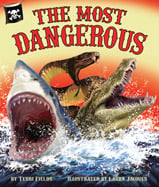Alignment to Standards for FL

| Grade | Number | Standard |
|---|---|---|
| 1 | SS.1.G.1.4 | Identify a variety of physical features using a map and globe. |
| 2 | SC.2.L.17.2 | living things are found all over Earth, but each is only able to live in habitats that meet its basic needs. |
| 2 | SS.2.G.1.1 | Use different types of maps to identify map elements. |
| 3 | SC.3.L.15.1 | Classify animals into major groups (mammals, birds, reptiles, amphibians, fish, arthropods, vertebrates and invertebrates, those having live births and those which lay eggs) according to their physical characteristics and behaviors. |
| 4 | SC.4.L.16.3 | Recognize that animal behaviors may be shaped by heredity and learning. |
| 5 | SC.5.L.14.2 | Compare and contrast the function of organs and other physical structures of plants and animals, including humans, for example: some animals have skeletons for support -- some with internal skeletons others with exoskeletons -- while some plants have stem |
| 5 | SC.5.L.17.1 | Compare and contrast adaptations displayed by animals and plants that enable them to survive in different environments such as life cycles variations, animal behaviors and physical characteristics. |
| K | SC.K.L.14.2 | Recognize that some books and other media portray animals and plants with characteristics and behaviors they do not have in real life. |
| K | SC.K.L.14.3 | Observe plants and animals, describe how they are alike and how they are different in the way they look and in the things they do. |
| K | SS.K.G.1.2 | Explain that maps and globes help to locate different places and that globes are a model of the Earth. |
| K | SS.K.G.1.3 | Identify cardinal directions (north, south, east, west).¾ |
| K | SS.K.G.1.4 | Differentiate land and water features on simple maps and globes. |